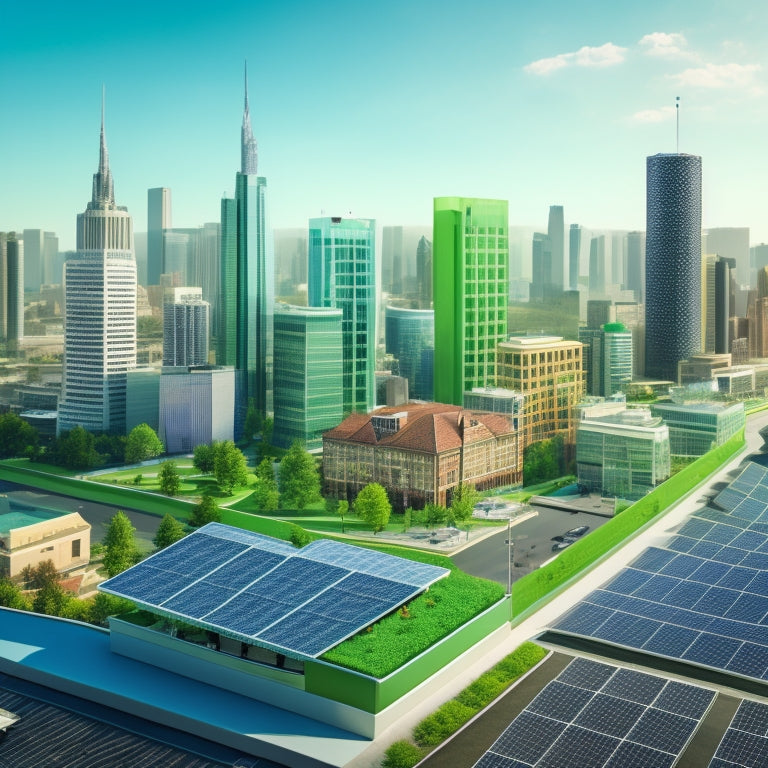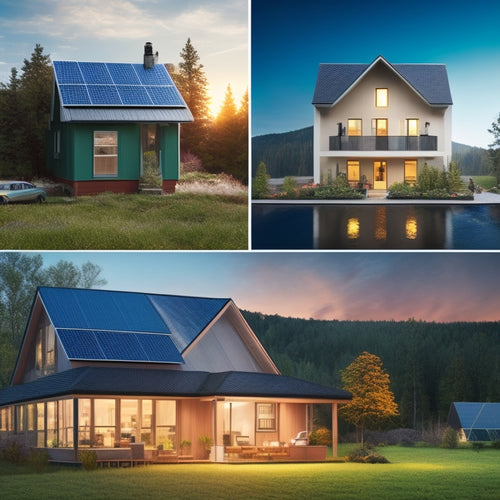
3 Cool Roof Certifications You Need to Know
Share
You need to be familiar with at least three key cool roof certifications to guarantee your roofing projects meet energy efficiency and sustainability standards. ENERGY STAR, Cool Roof Rating Council (CRRC), and California Title 24 are three essential certifications to know. ENERGY STAR certifies products meeting energy efficiency guidelines, CRRC measures and certifies solar reflectance and thermal emittance of roofing products, and California Title 24 establishes energy efficiency standards for buildings, including cool roofs. By understanding these certifications, you'll be well on your way to creating sustainable, energy-efficient roofing solutions - and that's just the beginning of what you can achieve.
Key Takeaways
- ENERGY STAR certifies products meeting energy efficiency guidelines from the EPA, ensuring reduced energy consumption and a lower carbon footprint.
- The Cool Roof Rating Council (CRRC) measures and certifies solar reflectance and thermal emittance of roofing products, promoting sustainable roofing solutions.
- California Title 24 establishes energy efficiency standards for buildings, including cool roofs, to reduce greenhouse gas emissions and promote environmental health.
- Familiarity with these programs ensures compliance with energy efficiency standards and supports a sustainable future by promoting renewable energy sources.
- Incorporating solar-powered EV charging stations into cool roof designs can further reduce carbon footprint and minimize environmental impact.
What Are Cool Roof Certifications?
Get familiar with the concept of cool roof certifications, which have become a staple in the roofing industry. You're probably wondering what they're all about.
Fundamentally, cool roof certifications are third-party verifications that a roof meets specific standards for energy efficiency and environmental sustainability. These certifications guarantee that your roof can reflect solar rays, reducing heat gain and energy consumption.
This, in turn, minimizes your building's carbon footprint and environmental impact. For instance, incorporating solar energy solutions into your roofing design can considerably reduce your reliance on fossil fuels and lower emissions.
Benefits of Cool Roof Certification
Now that you understand the concept of cool roof certifications, you're likely curious about the benefits they bring to the table.
With a cool roof certification, you can expect significant energy savings due to the reduced heat gain during summer months. This leads to lower energy bills and a more comfortable indoor environment.
Furthermore, cool roofs have a positive environmental impact by reducing the urban heat island effect, mitigating smog formation, and decreasing greenhouse gas emissions.
Shifting to renewable energy sources, such as solar power, can further enhance the benefits of cool roofs by reducing dependence on fossil fuels and promoting a sustainable energy future.
By choosing a certified cool roof, you're not only saving money but also contributing to a more sustainable future.
Top Cool Roof Certification Programs
Three prominent cool roof certification programs stand out in the industry: ENERGY STAR, Cool Roof Rating Council (CRRC), and California Title 24.
By incorporating solar-powered EV charging stations, building owners can further reduce their carbon footprint and energy costs fast charging infrastructure.
You'll want to familiarize yourself with these programs to guarantee your cool roof technologies meet the highest standards of energy efficiency.
ENERGY STAR certifies products that meet energy efficiency guidelines set by the U.S. Environmental Protection Agency.
CRRC is a non-profit that measures and certifies the solar reflectance and thermal emittance of cool roofing products.
California Title 24 sets energy efficiency standards for buildings, including cool roofs.
Frequently Asked Questions
Can Cool Roof Certifications Be Used for Residential Buildings?
You can definitely use cool roof certifications for residential buildings, enjoying benefits like reduced energy costs and increased comfort. When selecting a certified cool roof, verify you follow installation guidelines to maximize its effectiveness.
Are Cool Roof Certifications Required by Building Codes?
You'll find that building codes increasingly require cool roof certifications to guarantee building code compliance and meet energy efficiency standards, giving you the freedom to design and construct energy-efficient buildings that benefit both occupants and the environment.
How Long Does the Certification Process Typically Take?
You'll wait an eternity for your certification, but realistically, it takes around 2-6 months. You'll maneuver through the application process, submitting required documents and test results, and then patiently wait for the certification timeline to unfold, granting you the freedom to proceed with your project.
Can I Get Certified for a Single Cool Roof Product?
You can get certified for a single cool roof product, leveraging its unique product performance to reap certification benefits like enhanced credibility and marketability, while enjoying the freedom to showcase your proficiency.
Do Cool Roof Certifications Expire or Need Renewal?
You're probably wondering if your hard-earned certification will last an eternity - sadly, no! Most certifications have a limited shelf life, requiring renewal every 1-5 years, depending on the provider, to guarantee you stay up-to-date with developing industry standards.
Related Posts
-

What Does Your Home Energy Audit Report Reveal?
Your home energy audit report reveals a detailed analysis of your energy consumption patterns, highlighting areas of ...
-

Why Grow Up? Vertical Gardens Transform Urban Living
As you change your urban living space, you're not just growing up - you're bringing nature back into the heart of the...
-

10 Powerful Electric Mowers for Expansive Lawns
You're moving away from gas-powered mowers and exploring electric options for your expansive lawn. You'll find that h...


